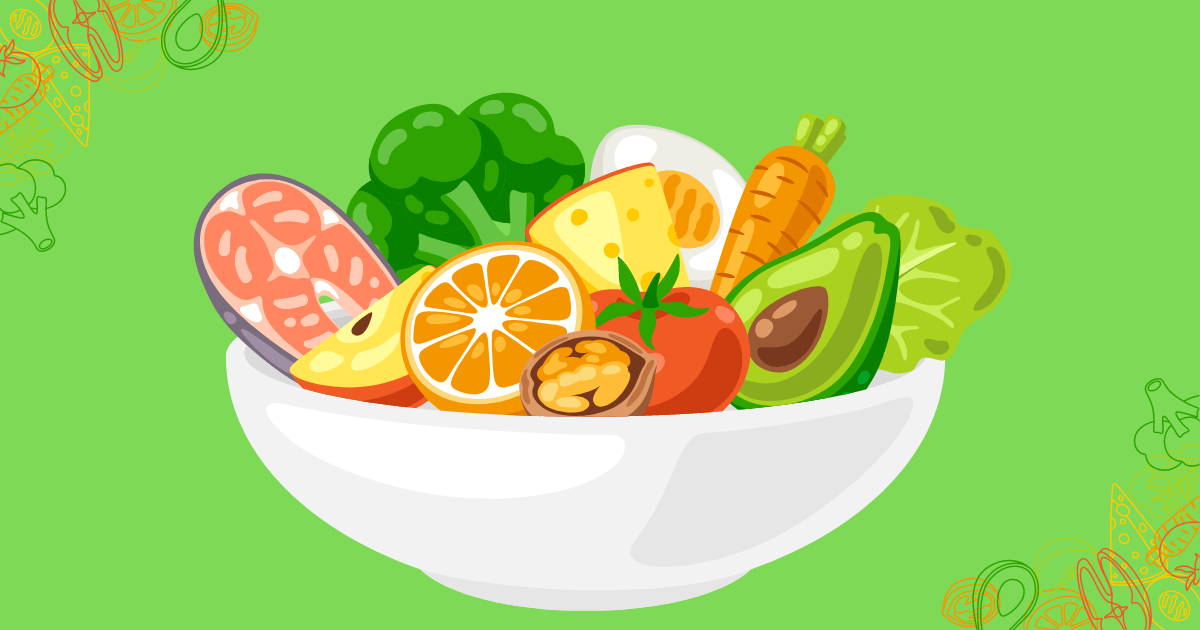When it comes to a well-balanced diet, protein is a crucial component that shouldn’t be overlooked. While most people associate protein with animal products like meat, eggs, and dairy, there is a wide variety of protein-rich vegetables and fruits that can provide you with the necessary nutrients. These plant-based sources of protein not only offer essential amino acids but also come with a range of other health benefits. In this article, we will explore the nutritional secrets of protein-rich vegetables and fruits, and how you can incorporate them into your diet for a power-packed protein punch.

1. The importance of protein in the diet:
Maintaining good health and wellbeing depends significantly on protein. It is a macronutrient that is responsible for building and repairing tissues, supporting the immune system, and producing enzymes and hormones. Protein is also crucial for muscle growth and development, making it an essential nutrient for athletes and individuals leading an active lifestyle. By incorporating protein-rich vegetables and fruits into your diet, you can ensure that you are meeting your body’s protein requirements while reaping the benefits of a plant-based diet.
2. Top protein-rich vegetables and their nutritional benefits:
1. Spinach: Spinach is not only a great source of iron, but it is also rich in protein. With approximately 2.9 grams of protein per cup, this leafy green vegetable is a must-add to your diet. Spinach is also packed with vitamins A, C, and K, as well as folate and antioxidants, making it a nutritional powerhouse.
2. Broccoli: Broccoli is a cruciferous vegetable that is not only high in protein but also low in calories. With around 2.6 grams of protein per cup, broccoli is an excellent choice for those looking to increase their protein intake. It is also rich in fiber, vitamins C and K, and antioxidants, which contribute to its health benefits.
3. Brussels sprouts: Brussels sprouts may not be everyone’s favorite, but they are certainly worth including in your diet. With approximately 3 grams of protein per cup, these mini cabbages offer a good amount of protein. They are also a great source of vitamins C and K, fiber, and antioxidants, making them a nutritious addition to any meal.
Related: 7+ Best Protein Sources For Vegans And Vegetarians
3. Protein-rich fruits and their health benefits:
1. Avocado: While most fruits are not a significant source of protein, avocados are an exception. With approximately 4 grams of protein per fruit, avocados provide a decent amount of protein along with healthy fats. They are also packed with vitamins C, E, and K, as well as potassium and fiber, making them a nutritious choice for a protein-rich fruit.
2. Guava: Tropical fruits like guava are not only delicious but also high in protein. With around 4.2 grams of protein per cup, guava can be a surprising source of this macronutrient. It is also loaded with vitamins A and C, fiber, and antioxidants, which contribute to its overall health benefits.
3. Blackberries: Blackberries are a sweet and tangy fruit that is also high in protein. With approximately 2 grams of protein per cup, blackberries offer a decent amount of protein along with other nutritional benefits. They are also rich in vitamins C and K, fiber, and antioxidants, making them a healthy addition to any diet.
Related: How much protein you need As you Age
4. How to incorporate protein-rich vegetables and fruits into your diet:
Incorporating protein-rich vegetables and fruits into your diet doesn’t have to be complicated. Here are a few easy tips to get you started:
1. Add leafy greens to your meals: Whether it’s spinach, kale, or Swiss chard, adding leafy greens to your meals is an easy way to increase your protein intake. You can toss them into salads, stir-fries, or soups, or even blend them into smoothies for a nutrient-packed meal.
2. Snack on fruits: Instead of reaching for processed snacks, opt for protein-rich fruits like avocados, guavas, or blackberries. You can enjoy them on their own or pair them with nuts or seeds for a balanced snack.
3. Experiment with vegetarian recipes: There are countless vegetarian recipes available that incorporate protein-rich vegetables and fruits. Whether it’s a quinoa and vegetable stir-fry or a lentil and spinach curry, these recipes provide a delicious way to get your protein fix.
Related: 15 Best High-Protein Foods
5. Protein-rich vegetarian recipes using vegetables and fruits:
1. Quinoa and vegetable stir-fry: Quinoa should be prepared according to the instructions on the package and then put aside. In a large pan, heat olive oil and sauté your favorite vegetables like bell peppers, broccoli, and carrots. Add cooked quinoa to the pan and season with soy sauce, garlic, and ginger. Serve hot, mixing until completely combined.
2. Lentil and spinach curry: In a large pot, heat oil and sauté diced onion, garlic, and ginger until fragrant. Add lentils and vegetable broth, and simmer until lentils are tender. Stir in chopped spinach and cook until wilted. Season with curry powder, turmeric, and salt. Serve with rice or naan bread.
3. Chickpea and avocado salad: In a large bowl, combine cooked chickpeas, diced avocado, cherry tomatoes, cucumber, and red onion. Drizzle with olive oil and lemon juice, and season with salt, pepper, and fresh herbs like parsley or cilantro. Toss until well combined and refrigerate for at least 30 minutes before serving.
Related: Avocado’s Benefits, Nutrition Facts, and Delicious Recipes
6. Protein-rich smoothie recipes with vegetables and fruits:
1. Green protein smoothie: In a blender, combine spinach, kale, almond milk, a ripe banana, and a scoop of your favorite plant-based protein powder. Blend until smooth and creamy. You can also add a tablespoon of nut butter for extra protein and flavor.
2. Berry protein smoothie: In a blender, combine mixed berries, a handful of spinach, coconut water, and a scoop of vanilla protein powder. Blend until well combined and enjoy this refreshing and protein-rich smoothie.
3. Tropical protein smoothie: In a blender, combine frozen pineapple, mango, coconut milk, and a scoop of your favorite plant-based protein powder. Blend until smooth and creamy. For an additional nutritional boost, feel free to add some pieces of spinach.
Related: Crafting Nutrient-Rich Healthy Diet Plan (Ultimate Guide)
7. Protein-rich snack ideas using vegetables and fruits:
1. Veggie sticks with hummus: Slice carrots, celery, bell peppers, and cucumbers into sticks and serve with a side of homemade hummus. This protein-rich snack is not only delicious but also packed with nutrients.
2. Apple slices with nut butter: Slice an apple and spread your favorite nut butter on top. The combination of protein-rich nut butter and fiber-rich apple makes for a satisfying and nutritious snack.
3. Greek yogurt with berries: Top a bowl of Greek yogurt with a handful of protein-rich berries like blueberries, raspberries, or strawberries. This snack is not only high in protein but also provides a good dose of probiotics.
8. Protein-rich salad ideas with vegetables and fruits:
1. Spinach and quinoa salad: In a large bowl, combine baby spinach, cooked quinoa, cherry tomatoes, cucumber, red onion, and feta cheese. Mix with salt and pepper, and drizzle with olive oil and balsamic vinegar. Toss until well combined and serve chilled.
2. Chickpea and avocado salad: In a large bowl, combine cooked chickpeas, diced avocado, cherry tomatoes, cucumber, and red onion. Drizzle with olive oil and lemon juice, and season with salt, pepper, and fresh herbs like parsley or cilantro. Toss until well combined and refrigerate for at least 30 minutes before serving.
3. Watermelon and feta salad: In a large bowl, combine cubed watermelon, crumbled feta cheese, fresh mint leaves, and a drizzle of balsamic glaze. Toss gently until well combined and serve chilled.
Frequently Asked Questions
Q: Can I obtain enough protein if I just eat plants?
Yes, it is absolutely possible to get enough protein from a plant-based diet. By incorporating protein-rich vegetables and fruits, along with other plant-based sources of protein like legumes, nuts, and seeds, you can easily meet your protein requirements.
Q: Are there any protein-rich vegetables and fruits that are also low in calories?
Yes, many protein-rich vegetables and fruits are also low in calories. For example, broccoli and spinach are both high in protein and low in calories, making them excellent choices for those looking to maintain a healthy weight.
Q: Can I use protein-rich vegetables and fruits in my weight loss journey?
Absolutely! Protein-rich vegetables and fruits can be a valuable addition to your weight loss journey. They provide essential nutrients while keeping you feeling full and satisfied, which can aid in weight management.
Q: Are there any specific protein-rich vegetables and fruits that are beneficial for athletes?
Yes, athletes can benefit from incorporating protein-rich vegetables and fruits into their diet. These plant-based sources of protein provide essential amino acids for muscle growth and repair, making them a valuable addition to an athlete’s nutrition plan.
Q: How can I ensure that I am getting enough protein from my plant-based diet?
To ensure that you are getting enough protein from your plant-based diet, aim to include a variety of protein-rich vegetables and fruits, as well as other plant-based protein sources like legumes, nuts, and seeds. It is also helpful to consult with a registered dietitian or nutritionist who can help you create a well-balanced meal plan.
[blockquote align=”none” author=””]
Final Thoughts
Protein-rich vegetables and fruits are a valuable addition to any diet. They not only provide essential amino acids but also offer a range of other health benefits. By incorporating protein-rich vegetables and fruits into your meals, you can ensure that you are meeting your body’s protein requirements while enjoying the variety and flavors of plant-based foods. Whether it’s adding leafy greens to your meals, snacking on protein-rich fruits, or trying out vegetarian recipes, there are countless ways to embrace the power-packed protein punch from vegetables and fruits.
[/blockquote]

1 comment
Thank you for the good writeup It in fact was a amusement account it Look advanced to far added agreeable from you However how could we communicate